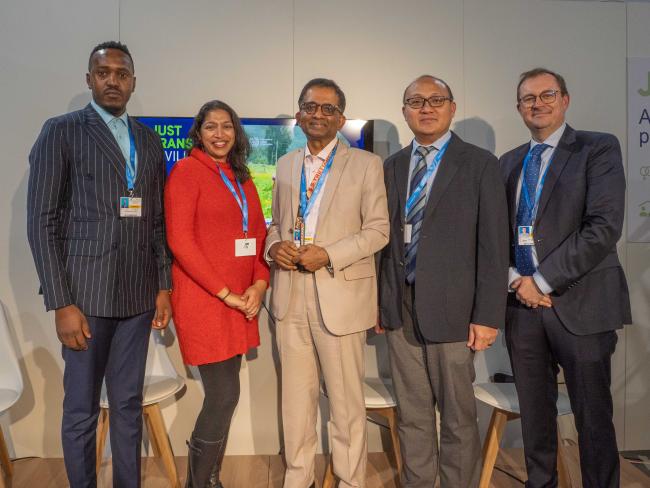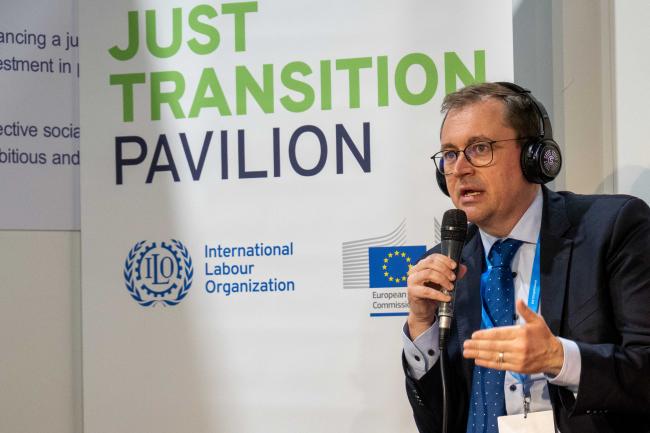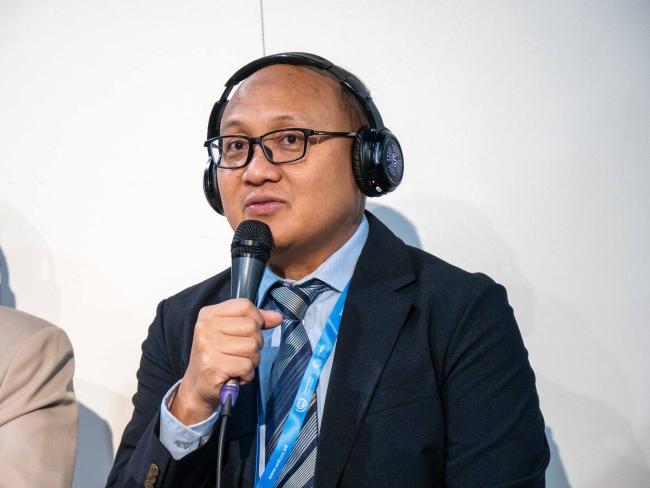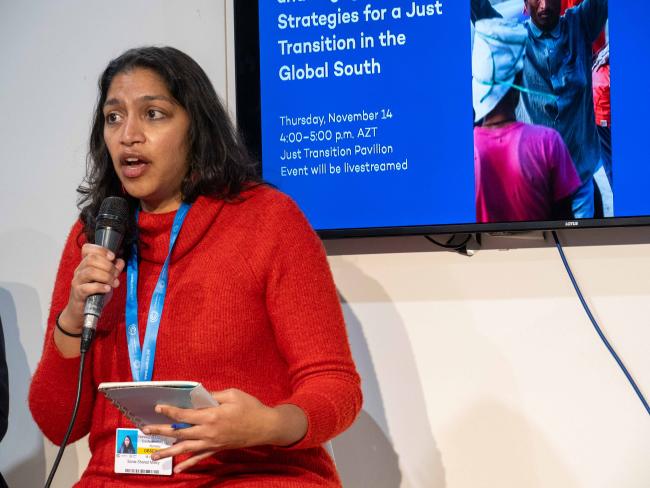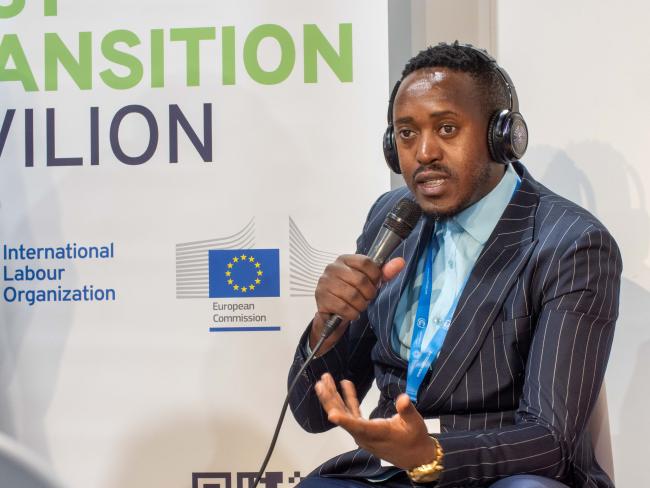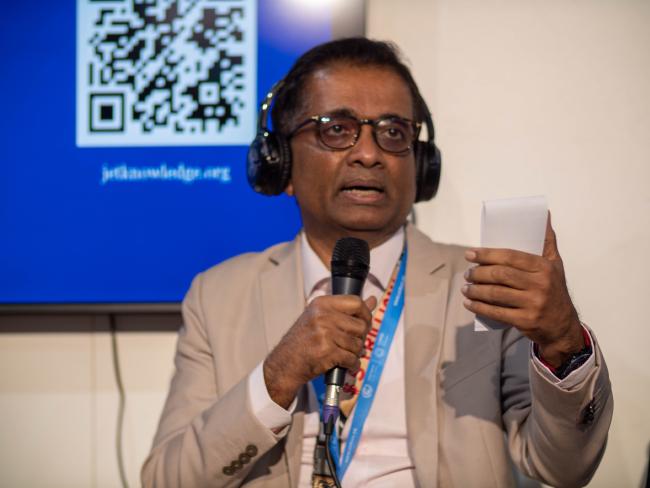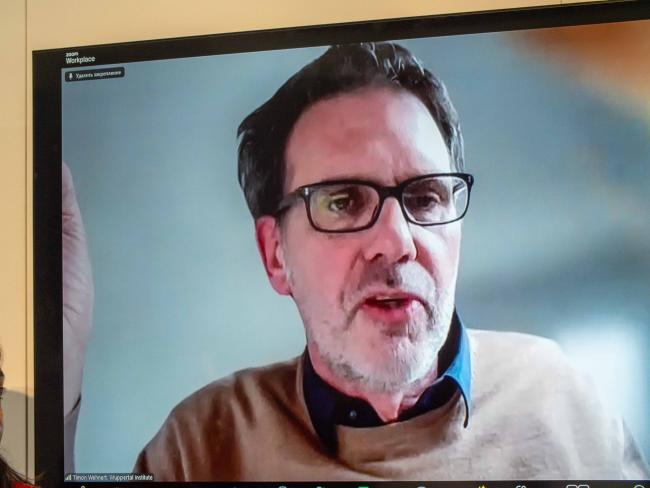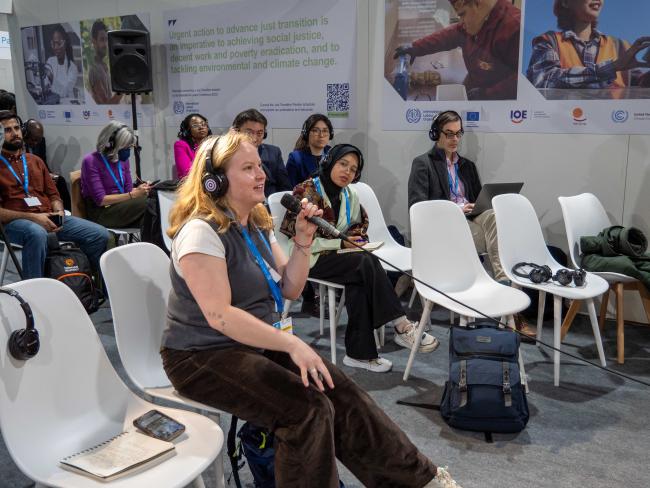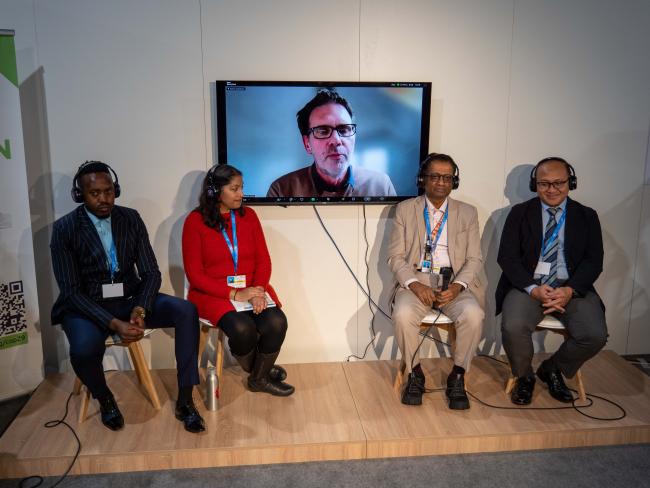About
Policymakers, civil society groups, and academic researchers shared experiences putting workers and their communities at the center of just transition roadmaps for achieving cleaner economies in equitable, inclusive ways.
Achieving a just transition to clean energy in the Global South requires innovative, practical, context-specific tools, especially in coal-dependent regions facing complex socioeconomic challenges. At this side event in the International Labour Organization’s (ILO) Just Transition Pavilion, policymakers, civil society groups, and academic researchers explored concrete examples of engaging with workers and their communities to empower them and ensure their needs are central in the transition to cleaner economies.
Moderator Philip Gass, IISD, opened the event by asking panelists to share experiences on the ground engaging with people to achieve just transition.
Nizhar Marizi, Ministry of National Development Planning, Indonesia, stressed the challenges of reaching ambitious targets for cleaner mixes of energy sources due to the competition between fossil fuels and renewables when there are abundant coal and gas resources. “It’s hard to have a fair playing field between those,” Marizi said, noting that achievements are speeding up. He hoped the investment climate will improve for Indonesia in the next five to 10 years.
Sonia Mistry, Solidarity Center, emphasized coalition building in Colombia involving engagement with community organizations, academic researchers, and workers to understand what justice means and to build a roadmap centered on the needs of workers and marginalized populations. Specific recommendations coming out of these participatory processes include retirement support, retraining, education, and resources to help workers relocate to find employment.
Zakhele Maya, Dipaleseng Task Force, underscored that intergovernmental processes, such as COP 29, tend to be disconnected from what is happening at the local level, and platforms are needed to help local communities meaningfully participate in these processes. Despite this disconnect, Maya said, “you would be shocked” by the extensive engagement happening within communities around just transition.
Nithi Nesadurai, CANSEA, highlighted the IKI JET project in Indonesia’s coal mining region, which involves a wide range of stakeholders and experts, including the Indonesian and German national governments, international labor organizations, Climate Action Network-International, IISD, the Wuppertal Institute for Climate, Energy and Environment, and local communities. One key to the project’s success, he said, is building trust between local communities and experts. Ultimately, he emphasized, research must be translated and simplified so that it is communicable to people on the ground in those communities.
Timon Wehnert, Wuppertal Institute, stressed that one of the challenges for effective engagement in seeking just transition solutions is the difficulty of seeing the process from another person’s perspective. Wehnert highlighted his research involving social simulation games in Indonesia and Colombia where people adopt different roles – essentially “stepping into each other’s shoes” – as they engage in dialogue.
Discussing how to unlock the financing required for just transition efforts, panelists emphasized the need for fostering social dialogue, providing directed and accessible funding, and ensuring that such efforts are sustained over the long term.
Maya pointed to the launch of a just transition platform in South Africa where funders interact and flows of finance to projects can be tracked. He emphasized that finance all too often comes with stringent conditions that don’t reflect “the reality we face.”
Mistry stressed the need to build ways of assuring a social dialogue that fully involves workers into initiatives. Marizi also noted that such dialogues must be institutionalized in local governments so they carry on long after projects are finished.
Nesadurai also stressed the need for the institutionalization of regional dialogues, continuity, and cooperation between developed and developing countries, with financing provided.
Wehnert urged adopting a long-term perspective, because decisions taken today will have an impact 20 years later.
In response to an audience member’s question about ways to reduce power imbalances in just transition engagement processes, panelists stressed, inter alia: reaching out to people when it is convenient for them; engaging at the municipal level; and organizing workers and building coalitions.
In final remarks, panelists considered how a just transition can work for youth who may be looking for opportunities in new job sectors. Wehnert suggested long-term thinking including potential changes in education systems. Maya underscored the need for partnerships with organizations and groups that can incubate small enterprises, as well as for finance without exclusionary conditions. Mistry urged a multisectoral, “whole economy” approach that supports labor rights. Nesadurai pointed to the importance of helping youth envision their own futures. Marizi urged more financial support for just transition through job training with the participation of local governments.
Organizer: IISD
Contact: Bethan Jones | bjones@iisd.org
Website: https://www.jetknowledge.org/
To receive free coverage of global environmental events delivered to your inbox, subscribe to the ENB Update newsletter.
All ENB photos are free to use with attribution. For 2024 UN Climate Change Conference Baku - Side Events , please use: Photo by IISD/ENB | Andres Carvajal

